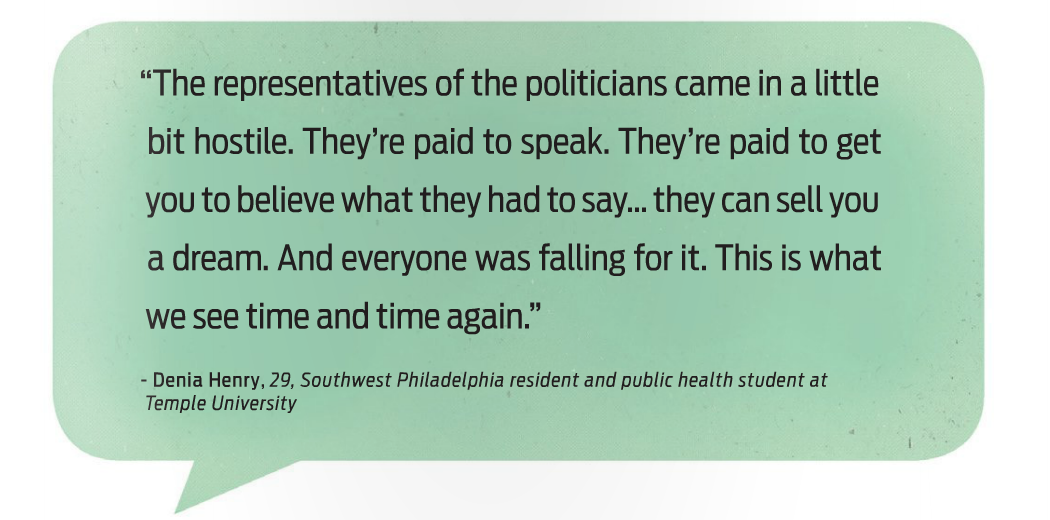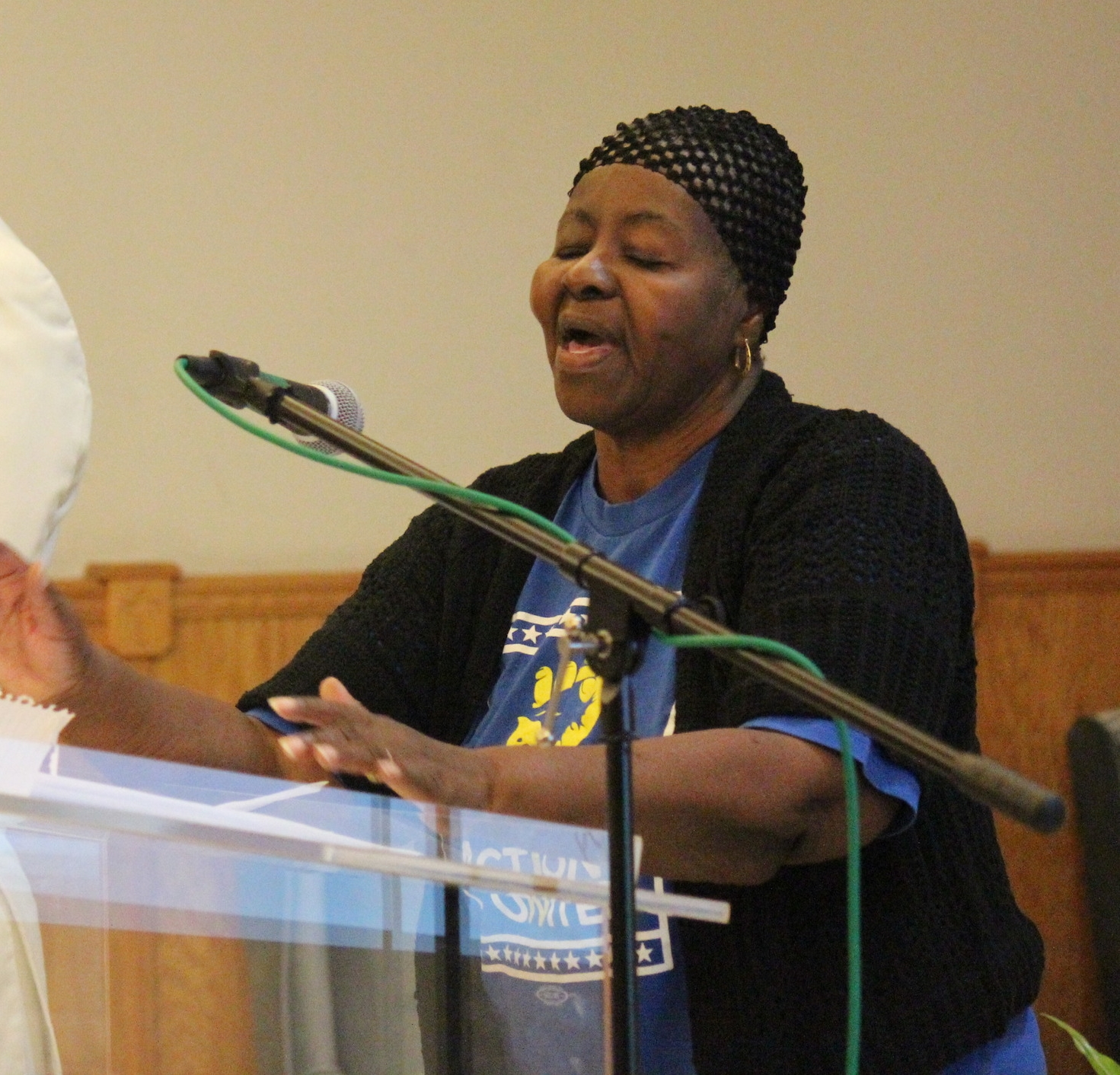Divided We Fall
by Heather Shayne Blakeslee
An organizing meeting with Action United in Southwest Philadelphia started out peaceably, but suffered from continual disruption from the chief of staff for State Representative Jordan Harris’ office.
On the evening of Nov. 17 at Grace Christian Fellowship Church, about 50 people—largely composed of community members and community organizers—gathered for an informational session and organizing meeting. Action United is a statewide organization that operates largely in Pittsburgh and Philadelphia; staff organizers are working with Southwest Philadelphia neighborhood residents concerned about the health impacts of the current and future operations of Philadelphia Energy Solutions (PES), which operates a refinery in the neighborhood.
According to the Environmental Protection Agency, PES is responsible for 70 percent of Philadelpha’s air pollution. The company has been lobbying to make Philadelphia an “energy hub,” which would bring significant natural gas operations—piped in from Pennsylvania Marcellus Shale fields—into the PES portfolio. It would also make the city a “hub” for petrochemical refinement and export, which could include the manufacturing of fertilizers and plastics.
A community information session on health impacts of current refinery operations began at 6 p.m. Organizers confirmed during and after the meeting that they wished to gather the community first in order to allow neighbors to be briefed and to collect questions before invited officials arrived.
Among those invited to attend the second half of the meeting at 7 p.m. were the offices of Councilman Kenyatta Johnson, Councilwoman Jannie Blackwell, State Senator Anthony Williams, State Representative Jordan Harris and Mayor-elect Jim Kenney. Alleged confusion over the time, place and agenda of the meeting—as well as not being privy to the community’s 6 p.m. discussion—put officials on the defensive.
When State Representative Harris’ chief of staff Gerald Johns took the microphone, he started calmly, but soon roiled to a boil. Johns veered back and forth between sympathizing with the audience, telling them, “I reached out to the people at PES today because I was confused like you… This is a problem for all of us,” and insinuating that organizers were purposefully using the community for their own means. “Don’t play games with me,” he yelled at the crowd. “I’m not a part of your political agenda. This air is for real, and it’s going to kill people. … I will say it again. We were invited to this meeting—at 7 o’clock. So, after everything that was going to take place was to take place, then we were to come in and be your whipping boys,” he shouted. “That’s not how we do business.”
He asked the audience to consider whether officials were the community’s enemies or allies, which drew some applause. “This is a neighborhood that is in trouble, and we’re playing games! We’re being used as bait.”
Who, exactly, was using the community as “bait” was not specified in Johns’ speech, but his mix of praise and aspersions continued: “I applaud these people’s efforts. I’m not putting them down. They have a reason for doing what it is that they’re doing,” he said. “But… after the community has been destroyed, you’ll still be here… and people are gonna come in and tell you all kinds of stuff, because you’re bait—‘Let me see if I can get some grant money with you.’”
“Don’t treat me like your adversary and then expect me to fight for you,” said Johns. “That’s not how this game gets done.”
His eventual call for unity elicited applause, while others looked on shaking their heads in silence. Whatever the audience may have thought about the confusing display, the meeting fell again into a disordered conversation about who invited whom, when, and at what time.
After Johns resumed shouting at the meeting hosts, the church’s Reverend Cean James took the floor to ask for calm, telling assembled visitors, “I don’t believe that anything is being accomplished by the behavior being demonstrated at this time… What’s happening right now is people’s egos are taking over.” Johns continued to argue with the pastor, who informed the crowd, and Johns in particular, that people who couldn’t be calm would need to leave.
Confusion and frustration
Despite intense backroom discussions throughout the city, the “hub” is still an amorphous and confusing topic for many. The lack of a concrete plan has given those politicians riding the fence an opportunity to participate in conversations while staying quiet publicly.
The concept of Philadelphia becoming an “energy hub” or “petrochemcial hub” has been widely reported in local and even national press; WHYY reported after the Action United meeting that PES CEO Rinaldi recently called at a conference for an “army” of supporters to help move the concept forward, and Forbes has asked whether Philadelphia will become the next Houston.
Grid also reported the story in March of 2015, the same month that City Council held hearings on the issue; during testimony, Councilman Johnson, who represents part of South Philadelphia, requested that Rinaldi consider conducting a study to evaluate community health impacts of such an expansion.
Chief of Staff Christopher Sample from Councilman Johnson’s office also addressed the community meeting on Nov. 17, telling the assembled crowd that, in a phone call to a PES representative that evening, he confirmed that there were no expansion plans.
Grid made an inquiry to Councilman Johnson’s office about the apparent discrepancy and confusion. His office sent this response:
“The invitation we received for the meeting referenced plans to expand the PES ‘refinery complex.’ At the meeting, Councilman Johnson’s Chief of Staff told community members that the office knew of no immediate plans for expansion of the PES refinery in South Philadelphia. City Council has had general conceptual discussions about the feasibility of an energy hub in the City of Philadelphia, but we are not aware of any concrete plans for expansion at the PES refinery. The confusion may stem from the fact that we were invited to arrive at the meeting at 7 p.m., after much of the discussion had already taken place. Accordingly, we thought the group was concerned about some imminent expansion at the PES refinery in South Philadelphia, not the general concept of a possible energy hub, which has been the subject of very open public hearings.”
His office also stated that they have since been in contact with organizers, and that “Councilman Johnson is committed to ensuring that residents in the area are protected before supporting development of any kind.”
Among the presenters during the first portion of the Nov. 17 meeting was Denia Henry, 29, a public health student at Temple University, a lifelong South Philadelphia resident, and a seven-year member of the community in which the event was held. She’s currently completing an internship with Physicians for Social Responsibility, and she briefed the crowd about health impacts of chemicals that are produced during refinery operations.
Others in the audience shared stories of family members who have been affected by cancer and asthma, and residents discussed concern about any expansion of PES activities until the impact of current operations is better studied and understood.
Maxine McCleary
One of the residents who expressed concern during her presentation was 74-year-old Maxine McCleary, who has lived in the neighborhood her whole life. She reiterated to Grid after the meeting that cancer and asthma afflict “every other person, and I have a big family.”
“He has asthma, really bad,” she said, referring to Jaylyn, a 9-year-old relative she’s raising. As if on cue, he coughed deeply. “He’s on the machine since he was a little boy,” she continued. “He’s still on the machine, and he takes medicine every day. … All of his siblings have [asthma]. And my daughter has it, my son has it.”
Organizers had four demands that were distributed and read at the meeting: that a study be conducted about health impacts of current refinery operations; that City Council enforce its own resolution requiring community meetings for review of emergency response plans in the event of an oil train derailment; an accounting of tax breaks that the refinery currently utilizes; and regular meetings with the community.
After the meeting, Henry told Grid, “The representatives of the politicians came in a little bit hostile. They’re paid to speak. They’re paid to get you to believe what they had to say… they can sell you a dream. And everyone was falling for it. This is what we see time and time again.” Meeting attendee Brice Baker called the behavior of the staffers “embarrassing” and “divisive.”
McCleary commented, “We know we can’t close down the refinery, but we want to see if we can stop the expansion, and now this person from Kenyatta’s office stops by and says there’s no plans for expansion? So now that’s something else we’ve got to work on tomorrow.”
While McCleary was pleased with the meeting overall, she wished there had been even more people there, and was upset by the tone. “We wasn’t trying to do what that guy said we was doing,” she said of Johns. “All we wanted to do was let the community know what was going on. … I think he was put here to disrupt our meeting.”













There is not much "new" or "innovative" about the proposed Energy Hub. It will used an outdated fuel source that has peaked. It is also at the sometime the Paris climate talks are trying to bring home the big news and urgency that we need to wean ourselves not addict ourselves further to this dirty, dangerous energy source.
It will be the step child to Houston… no poster child for good labor relations or good air quality, or general social responsibility to those with less means. Rinaldi has not guarantee that the Energy Hub will work. IT will not bring jobs to Philly if: it just refines the gas into chemical to sell to industries elsewhere, or if they can make a quick profit shipping the refined stuff overseas. It will only work in increase well paid jobs in any manner that will offset the caustic downsides of this deal unless it also brings in other industries to make products here… and those factories will also be polluters. Since Rinaldi and PES have no real control over those other industries, we as citizens have no guarantee that the promised and hoped for jobs will materialize. IF not they will get our tax incentive dollars to fund their windfall profits and we will be left with the mess to clean up. Not unlike PA’s oil boom and bust.
Better to spend the big bucks transitioning off fossil substances and towards a real 21st century city. We can do it because we own the gas company. We can have it gently transition from a gas supplier to and Energy Distribution manager. We can take the big bucks they need to repair all our gas lines and instead wean whole neighborhoods off gas to very energy efficient all electric homes. Transition Zero in the Netherlands, Italy and France is a great example. They retrofit whole blocks of rowhomes in about 2 weeks by prefab exterior panels.
Another group to learn from is Fort Collins, CO’s Fort ZED project. They are transitioning off fossil substances and creating an energy distribution manager and distribution systems upgrade.
Now these are innovative ideas, not hand-me-downs from Houston or like our NYC used cabs. Philly has grown up and we can embrace our heritage of being innovative as the Water Works were a century ago and as our water department is now. Let make Philadelphia the next Great City.